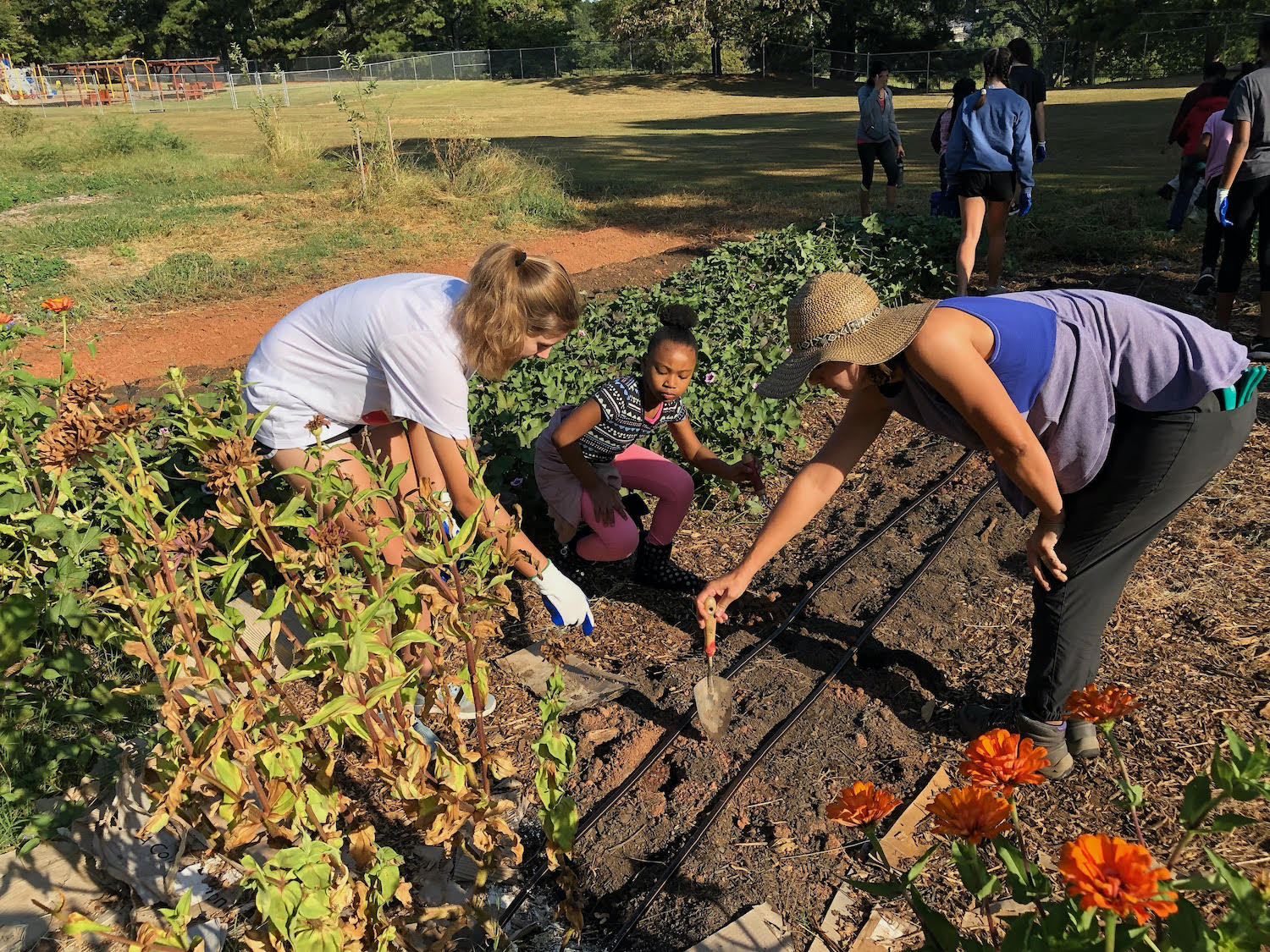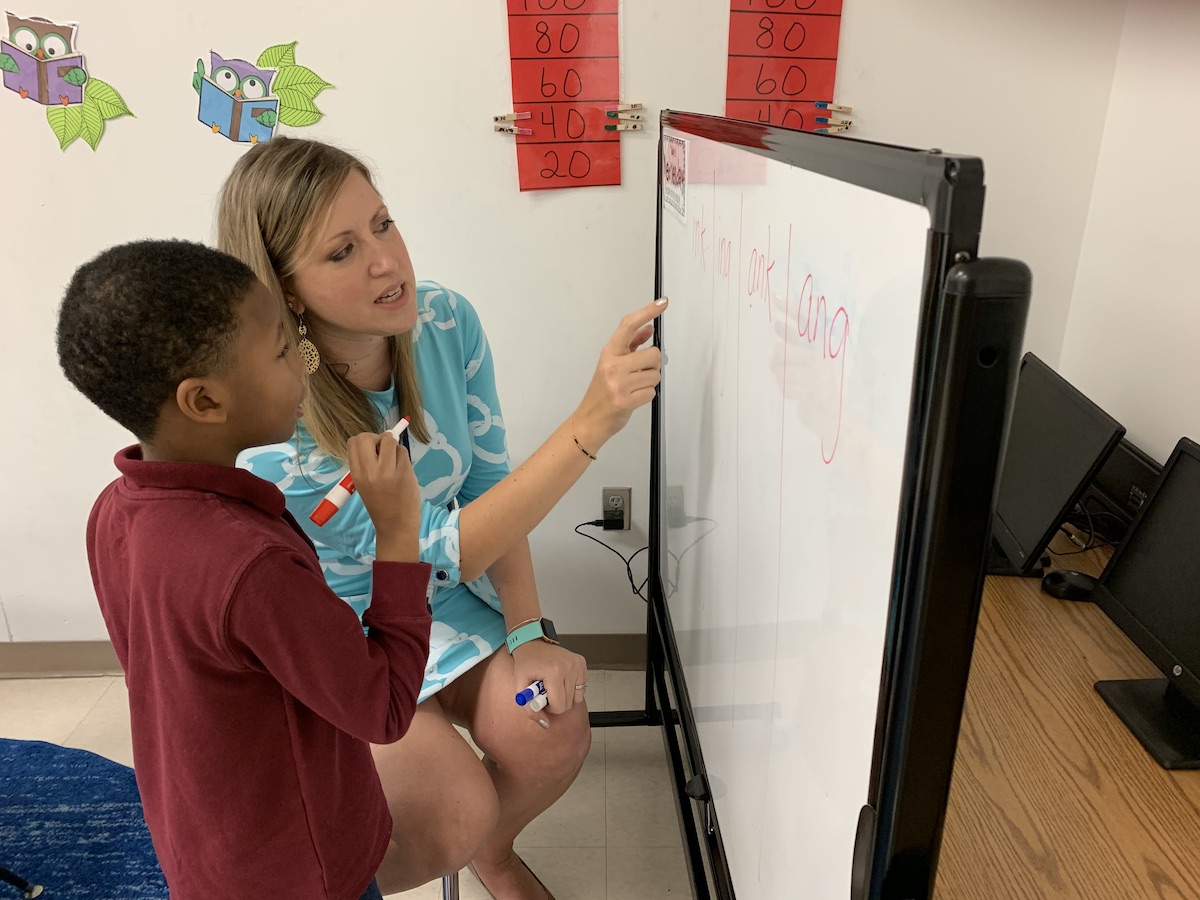[envira-gallery-slider id=”1409″]
When Ayanna Burroughs, a teacher at Thomasville Heights Elementary School (THES), reached out to Tania Herbert, Urban Agriculture Coordinator at The Paideia School, she hoped to learn from Paideia’s thriving farm program so she could start one at THES.
At the same time, Tania was hoping to replicate the program at other schools, particularly in those located in communities experiencing ‘food apartheid’ or food insecurity.
Both educators, located in very different parts of the city–southeast Atlanta and Druid Hills, wanted to encourage students to make change in their communities by learning how to decrease food insecurity through urban farming.
The schools partnered to create a thriving urban farm at THES. Paideia supports the THES Farm through mentorship and a close partnership that involves the sharing of knowledge, seeds, tools, materials and volunteers that enables the two schools to continue to learn and grow together and feed our communities.
“This program is about building bridges,” says Tania. “Without these shared urban farms at our schools, students may not have the opportunity to meet other students and families from different communities. We may not learn how much we have to offer each other, and how much we can gain from friendships with those outside our regular circles and neighborhoods. Now, students see that we’re all in this together.”
The THES/Paideia partnership quickly grew to include the Metro Atlanta Transitional Center, which assists residents completing the last portion of a felony sentence in making successful transitions back into the community through social and employment skills. This center now has its own urban farm to help equip women with skills to help them reintegrate into employment and community life.
“It’s so encouraging that three different communities can come together and grow so much food with the understanding that it’s not for any one of us in particular,” says Tania. “At the women’s transitional center, it’s empowering for them to work while incarcerated toward feeding families they may never meet. At Paideia, our families have been uplifted to serve families who don’t know where their next meal is coming from. And at THES, students are solving their own community’s needs by growing food to feed their own families and neighbors. This model is a great example of a place-based agricultural model- a grassroots effort to grow and feed our families.”
Combined, the three farms grow approximately 5,000 lbs of high quality produce each year. Next year, they are positioned to produce even more as Paideia relocates its urban farm to a larger plot of land in south Atlanta. The new farm will be closer to THES and the women’s center, which will allow the alliance to better support each other.
The organizations distribute their bumper crop of produce in three ways to help feed the community.
First, THES students give teachers and families tokens to “purchase” food from student-run farm stands during the school year. The students harvest, wash and package the food themselves.
Second, the organizations select the very best produce gathered from the three farms and donate it to the Urban Recipe Cooperative, which serves 50 families in the Thomasville Heights community. Next year, the cooperative will serve families in the Slater Elementary School neighborhoods, as well.
Third, fresh produce is donated to Intown Collaborative Ministries, a Saturday morning food pantry that serves 80 families.
“What’s different about our alliance is that we give our very best produce to the communities we serve,” says Tania. “Often, donated produce is old and of poor quality. But we don’t do that. We give our families our best food first because that is what we all should have and we believe it provides more dignity.”
The THES team looked to Paideia’s model to incorporate farming, composting and agency into its curriculum. Purpose Built Schools hired Eva Dickerson, a Spelman graduate, THES’ farmer, to run the THES urban farm and support the school curriculum.
At THES, all grades have access to the farm to explore the natural world and for hands-on lessons, and 3rd and 4th graders use the garden as a quarterly project-based learning project on change-making, food insecurity and how to feed the community.
Through the Summer Farm Apprenticeship program, Carver STEAM Academy students and high school students in Paideia’s Urban Agriculture Program are paid to grow and learn together at both school farms, while accumulating agricultural skills and supporting families who need food during the summer. This opportunity provides meaningful paid employment and allows students to learn different farming systems.
“This partnership forms an unlikely alliance between a private school, a Title 1 school, and a women’s transitional center,” says Tania. “Three organizations that may not have normally come together, but when united, we formed a grassroots movement that benefits everyone involved and grows an abundance of food for underserved communities with food insecurity.”
Watch THES Farm in Action
During the COVID-19 outbreak, the THES Farm helped meet needs and build bridges.
When schools closed, Tania and Javan Wyche, Director of After-School Programming at THES, identified gaps in food access for students. They formed the Thomasville Heights (T.H.E.) Take-Home Project and mobilized volunteers and parents from the community to provide hygiene kits, breakfasts, lunches and dinners to THES students. Many of those meals were created with produce from the THES Farm.
It’s also important to be aware that in this time of shared crisis we have been able to support each other. “It’s a two way street,” says Tania. “We’re partners in this collective and all our families are affected in numerous ways. It’s a powerful thing to know that our communities have each other’s back when we most need it”.









